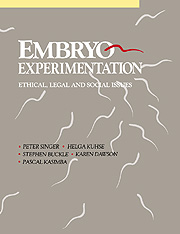Book contents
- Frontmatter
- Contents
- Foreword
- ACKNOWLEDGEMENTS
- INTRODUCTION
- PART 1 THE SCIENTIFIC ISSUES
- PART 2 THE ETHICAL ISSUES
- ARGUMENTS ABOUT THE STATUS OF DIFFERENT DEVELOPMENTAL STAGES
- 5 Fertilization and moral status: A scientific perspective
- 6 Segmentation and moral status: A scientific perspective
- 7 Individuals, humans and persons: The issue of moral status
- ARGUMENTS FROM POTENTIAL
- EMBRYO RESEARCH AND WOMEN
- PART 3 CONTROLLING EMBRYO EXPERIMENTATION IN A DEMOCRATIC SOCIETY
- FORMING A PUBLIC POLICY
- LEGISLATION AND ITS PROBLEMS
- APPENDICES
- GLOSSARY
- NOTES ON CONTRIBUTORS
- INDEX
5 - Fertilization and moral status: A scientific perspective
Published online by Cambridge University Press: 05 June 2012
- Frontmatter
- Contents
- Foreword
- ACKNOWLEDGEMENTS
- INTRODUCTION
- PART 1 THE SCIENTIFIC ISSUES
- PART 2 THE ETHICAL ISSUES
- ARGUMENTS ABOUT THE STATUS OF DIFFERENT DEVELOPMENTAL STAGES
- 5 Fertilization and moral status: A scientific perspective
- 6 Segmentation and moral status: A scientific perspective
- 7 Individuals, humans and persons: The issue of moral status
- ARGUMENTS FROM POTENTIAL
- EMBRYO RESEARCH AND WOMEN
- PART 3 CONTROLLING EMBRYO EXPERIMENTATION IN A DEMOCRATIC SOCIETY
- FORMING A PUBLIC POLICY
- LEGISLATION AND ITS PROBLEMS
- APPENDICES
- GLOSSARY
- NOTES ON CONTRIBUTORS
- INDEX
Summary
Advances in reproductive technology have made it technically possible for the early human embryo to be an experimental subject. This has enlivened debate concerning the moral status of the prenate, for some consensus on this issue is essential for policy formation aimed at regulating the future of such research.
Within the context of the abortion debate, various landmarks in prenatal development are nominated as the determinant of full moral status. Developmentally the earliest of these is fertilization. Human fertilization is a complex process requiring about 24 hours for completion. Viewed simply, it begins with a spermatozoon, the male gamete, penetrating the ovum or female gamete and culminates in the mingling of the genetic material from each to form a single-celled zygote (see Fig. 1 in the Introduction to this book). This chapter examines some of the arguments for claiming that fertilization is the basis for full moral status in the context of current scientific knowledge. Have these arguments been stated with sufficient precision to cope with the facts as we now understand them? Do they need to be modified and, if so, how might this be done?
Fertilization and moral status: The arguments examined
Arguments in support of fertilization as the time at which full moral status is acquired either rely solely on features of the fertilization process, or on some of its aspects in combination with an emphasis on the potential of the newly formed entity.
- Type
- Chapter
- Information
- Embryo Experimentation , pp. 43 - 52Publisher: Cambridge University PressPrint publication year: 1990
- 2
- Cited by

